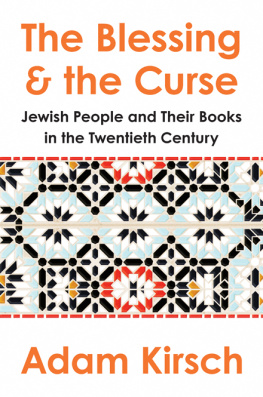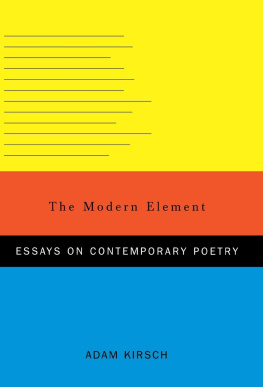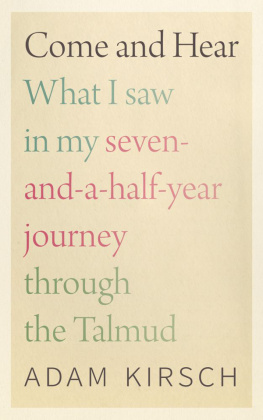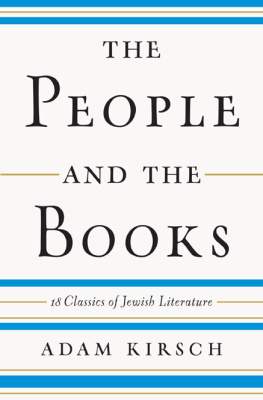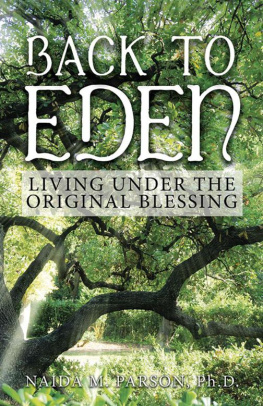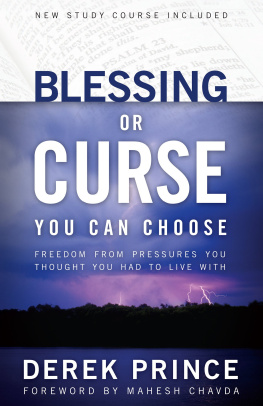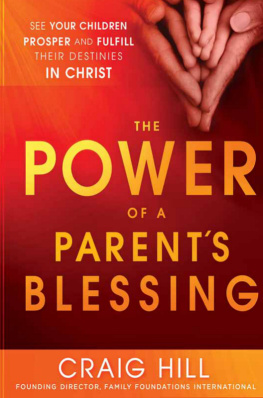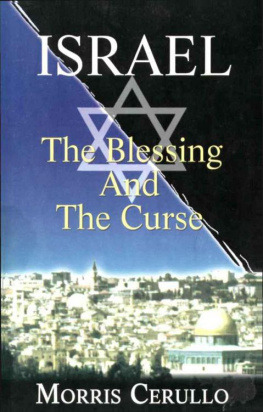Adam Kirsch - The Blessing and the Curse
Here you can read online Adam Kirsch - The Blessing and the Curse full text of the book (entire story) in english for free. Download pdf and epub, get meaning, cover and reviews about this ebook. publisher: W. W. Norton & Company, genre: Religion. Description of the work, (preface) as well as reviews are available. Best literature library LitArk.com created for fans of good reading and offers a wide selection of genres:
Romance novel
Science fiction
Adventure
Detective
Science
History
Home and family
Prose
Art
Politics
Computer
Non-fiction
Religion
Business
Children
Humor
Choose a favorite category and find really read worthwhile books. Enjoy immersion in the world of imagination, feel the emotions of the characters or learn something new for yourself, make an fascinating discovery.
- Book:The Blessing and the Curse
- Author:
- Publisher:W. W. Norton & Company
- Genre:
- Rating:3 / 5
- Favourites:Add to favourites
- Your mark:
- 60
- 1
- 2
- 3
- 4
- 5
The Blessing and the Curse: summary, description and annotation
We offer to read an annotation, description, summary or preface (depends on what the author of the book "The Blessing and the Curse" wrote himself). If you haven't found the necessary information about the book — write in the comments, we will try to find it.
The Blessing and the Curse — read online for free the complete book (whole text) full work
Below is the text of the book, divided by pages. System saving the place of the last page read, allows you to conveniently read the book "The Blessing and the Curse" online for free, without having to search again every time where you left off. Put a bookmark, and you can go to the page where you finished reading at any time.
Font size:
Interval:
Bookmark:

THE
BLESSING
AND THE
CURSE
The Jewish People and Their Books
in the Twentieth Century

ADAM KIRSCH

W.W. NORTON & COMPANY
Independent Publishers Since 1923
N EAR THE END OF THE BOOK Of DEUTERONOMY, Moses charges the Israelites to keep the laws that God has given them, setting out two possible futures for the Jewish people. If they follow Gods laws, they will be blessed with prosperity and power in their Promised Land: And the Lord will make thee over-abundant for good, in the fruit of thy body, and in the fruit of thy cattle, and in the fruit of thy land, in the land which the Lord swore unto thy fathers to give thee. But if they forsake God, they will be cursed with pestilence and famine, defeated in war and left powerless before their enemies: The Lord will bring a nation against thee from far, from the end of the earth, as the vulture swoopeth down; a nation whose tongue thou shalt not understand; a nation of fierce countenance, that shall not regard the person of the old, nor show favor to the young.
Moses promises the Israelites that their fate lies in their own hands, that God will deal with them as they deserve: I have set before thee life and death, the blessing and the curse; therefore choose life, that thou mayest live. Strangely, however, Mosess words also suggest that both parts of the prophecy, the blessing and the curse, are destined to come true: And it shall come to pass, when all these things are come upon thee, the blessing and the curse, which I have set before thee. It is as if he could foresee that, over the next three thousand years, the Jewish people would experience both blessing and curse, not just once but over and over again, with eras of glory and security giving way to eras of dispossession and terror. But in no epoch did the Jews experience the blessing and the curse in more extreme forms than in the twentieth century. In the span of a single lifetime, things that Jews had long thought impossible, because they were too precious to dream about or too horrifying to imagine, came to pass.

IN THE YEAR 1900, some seven million Jews lived in Eastern and Central Europe, about two-thirds of the worlds Jewish population. The primacy of this Ashkenazi heartland had, in fact, already begun to erode. Starting in the 1880s, a vast emigration, ultimately numbering two million people, had begun to carry Jews out of Eastern Europe to a new life in the United States. Around the same time, a much smaller group of Jews, numbering in the tens of thousands, began to settle in Palestine under the inspiration of Zionist ideals. These movements created the nucleus of the two communities that now make up most of world Jewry: today, America and Israel are each home to about 5.5 million Jews. These emigrations also turned out to be lifeboats sent out at the last moment, for between 1939 and 1945, Eastern European Jewry was largely annihilated in the Holocaust, which killed six million Jews. As a result, the worlds Jewish population is barely higher today than it was in 1900, even as the worlds total population grew sevenfold.
Each of these three historiesthe fate of the Jews in Europe, America, and Israelwas in its own way unprecedented. The Holocaust did not completely eradicate Jewish life in Europetoday, there are some 1.5 million Jews on the continent, now mostly in the west rather than the eastbut it did destroy a Jewish civilization that had endured, despite persecutions and expulsions, for a thousand years. In the decades before the Holocaust, many European Jews had tried to join gentile civilization, many others had remained committed to traditional ways, and an intrepid few had tried to unite both worlds. But the Nazis were indiscriminate, killing every Jew they could findand thereby falsifying every answer to the question of how the Jews could live in Europe. The extremity of the evil called into question the central assumptions of both traditional Judaism and Western civilization, and perhaps neither has fully recovered since.
Ironically, at the very same time that Europe was proving itself unimaginably hostile, America was proving itself unprecedentedly welcoming. In the United States, particularly after World War II, Jews found a more open and liberal environment than perhaps anywhere they had lived in the Diaspora. Previous Jewish golden agesIslamic Spain, Enlightenment Germanyhad offered limited cultural and political opportunities to an elite, at best; America offered security and openness to almost everyone. Indeed, for much of the twentieth century, the chief worry of American Judaism was that it might disappear in the warm embrace of assimilation and intermarriagerather than in gas chambers, as was happening in Europe.
Meanwhile, Jews in Israel were fulfilling a dream even older than the dream of safety. In the year 70, after a Jewish revolt against Roman power, a Roman army destroyed the Temple in Jerusalem; in 135, after a second revolt, the Romans exiled the Jews from Judea and erased it from the map, renaming the province Syria Palestina (the origin of the modern name Palestine). For the next eighteen hundred years, no matter where they lived, Jews considered themselves to be in galut, exile. The idea that they would one day return to the Land of Israel was central to Judaism, if not to the actual daily lives of most Jews; but that return was conceived of in miraculous terms, as a deliverance that would come in the messianic age. But in 1948, after half a century of effort by Zionists and against violent opposition, the State of Israel was born, and Jewish sovereignty was restored in the very place where it had disappeared two millennia earlier.
Perhaps the best way to think of these twentieth-century destinies is as the liquidation of the Jewish concept of exile. In Europe, it was terminated by the death of six million Jews, which seemed to show that exile was no longer a possible way of life but only an avenue to death. In America, exile came to seem like a false description of Jewish life, as Jews began to see themselves as part of the new narrative of American immigration, rather than the ancient story of Jewish wandering. And in Israel, exile was directly refuted by Zionism, whose goal was the creation of a country where Jews could finally be at home, rather than unwanted guests. After all these transformationsand the enormous, universal transformation wrought by modern secularism and rationalismhow could Jews in the twentieth century continue to believe the same things in the same way that their ancestors did? But if they didntif most modern Jews no longer believed in Jewish doctrines or obeyed Jewish lawsthen what did it mean to call themselves Jews?
In one way, at least, Jews met these revolutionary times with a traditional response: they wrote books. Judaism is a religion founded on textsthe Bible and the Talmudand textual study had always been the hallmark of Jewish education; in rabbinic Judaism, mastery of textual interpretation was the highest religious as well as intellectual achievement. Over the centuries of exile, while Jews were largely unable to create physical monuments or exert political power, they channeled their creative energy into the production of books.
But in literary terms, too, the twentieth century marked a departure. In post-biblical Jewish writing, the most prestigious texts were not what we would now call imaginative literature. They were, rather, books of legal analysis, philosophy, mystical speculation, biblical interpretation, liturgical poetry, or moral instruction. Jewish literature was literature about Judaism in all its aspects. Not until the nineteenth century did this begin to change, as Jews made contact with secular European culture and began to produce autonomously literary writing. And not until the twentieth century does it become possible to gain an unprecedentedly rich and intimate understanding of Jewish experience by reading novels, poems, plays, and memoirs by Jewish writersin Yiddish and Hebrew, as well as in English, Russian, German, and the other languages Jews began to speak in large numbers.
Next pageFont size:
Interval:
Bookmark:
Similar books «The Blessing and the Curse»
Look at similar books to The Blessing and the Curse. We have selected literature similar in name and meaning in the hope of providing readers with more options to find new, interesting, not yet read works.
Discussion, reviews of the book The Blessing and the Curse and just readers' own opinions. Leave your comments, write what you think about the work, its meaning or the main characters. Specify what exactly you liked and what you didn't like, and why you think so.

